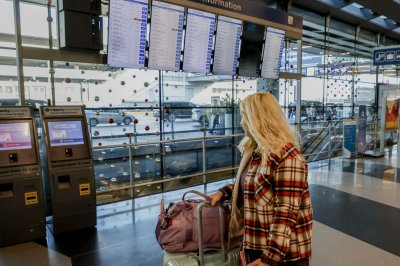Nov. 8 (UPI) — Federal officials on Saturday canceled more than 800 flights at airports across the United States as the federal government shutdown entered its record-long 39th day on Saturday.
Transportation Secretary Sean Duffy and FAA Administrator Bryan Bedford jointly announced a temporary 10% reduction in flights at 40 high-traffic airports.
They said the reduction in flights is necessary to ensure safety and ease the strain on air traffic controllers, who are working without pay.
“My department has many responsibilities, but our number one job is safety,” Duffy said.
“It’s safe to fly today, and it will continue to be safe to fly next week because of the proactive actions we are taking.”
More than 1,700 flights have been canceled through Sunday — and more than 800 were cancelled on Saturday alone — as commercial airlines reduced their respective flights by 4% at the nation’s busiest airports, according to CNN.
Washington’s Reagan National Airport is affected the most by the flight reductions, with 151 flights canceled among 869 initially scheduled there for a reduction of 17.4%, The New York Times reported.
Louisville, Ky., has an 8% reduction with 12 canceled among 150 flights, followed by Cincinnati, 7.2% and 18 canceled flights among 250 scheduled.
Houston Hobby has 20 of 336 flights canceled for a 6% reduction, followed by Indianapolis, with 17 of 297 flights canceled for a 5.7% reduction, to round out the five most impacted airports.
The flight reductions come after many air traffic controllers and other essential airport staff have called in sick due to increased stress, to work other jobs and to care for their children, among other reasons.
They have missed one paycheck and will again next week if the federal government is not funded and reopened by then, according to CNBC.
The reduced staffing levels are putting more pressure on commercial air operations, especially at the nation’s busiest airports.
“We are seeing signs of stress in the system, so we are proactively reducing the number of flights to make sure the American people continue to fly safely,” Bedford said.
“The FAA will continue to closely monitor operations, and we will not hesitate to take further action to make sure air travel remains safe.”
